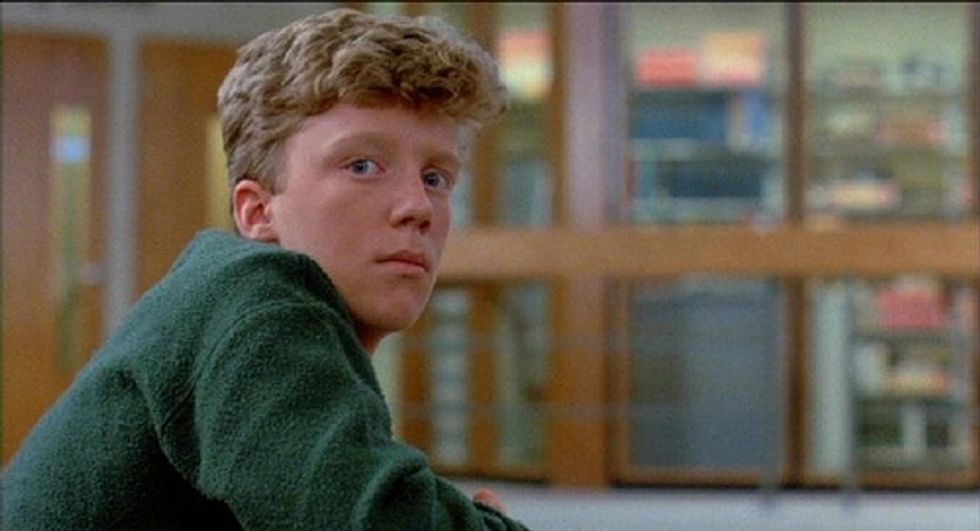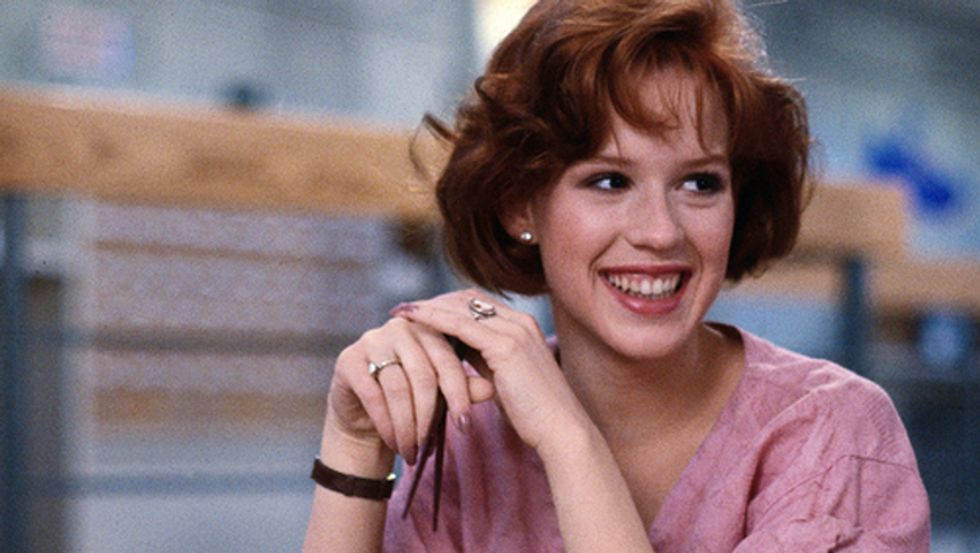*Disclaimer: I have rudimentary psychological knowledge. I only took two years of it in high school. This is only for fun* And I know I left out Allison! So sorry, but I didn't feel like diving into all of her issues.
The Brain
Brian, unfortunately, is considered the lowest rung on the social ladder, a fact that he himself is all too painfully aware of. His self-given trope is ‘the brain’ meaning that his defining trait, defined by himself and others, is his intelligence. Because Brian knows that he in a lower social caste than the others in detention, he is always vying for their attention. He is also desperately trying to fit in. He implements ‘informational social influence’ meaning that he observes others in order to understand social norms. For example, when Bender hassled Claire if she was a virgin or not, Brian hesitantly observed the exchange before joining in. That example could also be categorized under conformity and minority influence from Bender. Brian conformed to what the ‘cool’ person, aka Bender, was doing in order to seem more socially acceptable. His family values his intelligence more than him as a person. This is damaging psychologically and resulted in Brian having a complete mental breakdown when receiving a D on an assignment. He couldn’t handle his failure and gathered the necessary materials to kill himself. This is a huge red flag that his parents seemingly brushed off, his mom when dropping him off for detention was talking in a very hostile tone and demanded that he find a way to study. A completely ridiculous way to interact with someone who very nearly committed suicide. The group as a whole assumed that Brian came from an attentive and loving family, as seen when Bender mocked Brian’s wholesome lunch and acted out what he thought Brian’s home life was like. In reality, Brian’s home life can’t be good, the strain his parents put him through leaves him with a very fragile ego, leaving him susceptible to peer pressure. This can be seen when Bender, by using majority influence, convinces the rest of the group to smoke marijuana. Brian is visibly uncomfortable and verbally questions doing drugs in school, but eventually, conforms. He adjusted his thoughts and behaviors in order to rationalize doing drugs because it seemed that that was how he was supposed to behave. Humans have a natural instinct to belong and in Brian’s sensitive state, it seemed that those feelings were amplified to a rather large extent.
The Princess
Claire sees herself as superior to everyone excluding Andrew, who is of an equal social status to herself. She implements social categorization to understand and organize the world around her. She sees herself as higher in the social hierarchy because she is more ‘popular’ in the sense that she has more friends, attends more social events and is considered wealthy. She groups people either as ‘in-group’ or ‘out-group’ this can be further rationalized by her initial disdain of Bender before he had even caused a disruption or even her patronizing tone that she uses when talking with Brian as if he is beneath her. She sees herself as a tool that her parents manipulate for their own purposes. Due to that situation, she is very aware of her worth as a person and the benefits people have of associating with her which further results in her having a snobby outer personality. In reality, her inner personality is very insecure. She’s always seeking approval, this can be seen when she makes a bold statement she looks to Andrew for assistance, such as when she told Brian that they would no longer be friends after Saturday. She’s afraid to make ripples and therefore seeks comfort in numbers by appealing towards Andrews agreement to validate her feelings.
The Athlete
Andrew on the surface is a one dimensional, dumb, aggressive athlete who fits every stereotype in the book. From being protective of Claire to fighting Bender to having an absurd lunch Andrew seems to be as deep a character as a kiddie pool. Andrew is so much more than what his first impression suggests. He is caring, loyal and an emotionally complex person with real flaws. Most surprising is his empathy and reflectiveness. When he reveals his reason for being in detention it’s hilarious. Everyone laughs at the fact that Andrew taped someone’s butt together. Once Andrew reveals his motivation and the aftermath, everyone becomes incredibly somber. Andrew discloses to the group that he feels that his father is an unloving machine who doesn’t see Andrew as his son, rather than an object to obtain athletic achievements. It’s very similar to mothers who enter young daughters into beauty pageants in order to live vicariously through their children. At first, Andrew uses a downward comparison in order to justify his actions. He reasoned that it was okay to torture some random kid because it would make his dad proud. He weighed that this outweighed any possible consequences. Andrew then displays deep regret at what he had done to the boy and explains how he put himself in his victim’s shoes and felt deep shame at his actions. Andrew’s accountability, reflectiveness, and empathy reveal that he is a far more relatable character than the audience and group first thought.
The Criminal
Bender is a low low-life scum bag with no future. His father, principal, and fellow peers have been telling him this for years. He lashes out like a caged animal because he feels constantly attacked by people’s judgement. For him it is very different than how judgement for someone else would be. For example, people think Brian is a nerd, but don’t say it to his face. With Bender, most people have no quarrel with telling him exactly what they think to him because they feel that Bender wouldn’t care. How could he? With his devil-may-care attitude and rebel persona, nothing can touch him. Wrong. What many don’t know, and don’t care to discover, is that Bender has a horrific home life. He lives with physically and verbally abusive parents. He doesn’t have one person in his corner, leading him to become hardened in order to protect himself and take on a loner persona. Because Bender is so used to being independent, he has obtained an air of authority and confidence which allows him to use minority influence to his advantage. He is an excellent manipulator because he understands other people all too well. He convinces the rest of the group to smoke marijuana even though none of them particularly want to. He also persuades them to make noise, leave the library, lie to help him (when he escaped from the closet and was trapped in the library), and reveal deep personal secrets. A psychological study that mimics Bender’s character would be ‘The Bobo Doll Experiment’ (Bandura, R.) This experiment showed children imitating actions and behaviors shown in hostile and non-hostile environments. Bender was raised in a verbally abusive household resulting in him being more verbally hostile towards the others, specifically Claire. He targets Claire more often because she represents everything he wants in life and can’t have. A (semi) loving family, friends, power, money and stability. All of her ‘problems’ seem incredibly superficial to him. The others reacted to him becoming violent and became more hostile themselves. When Bender yelled at Claire, Andrew stepped in and offered to physically fight Bender. This wouldn’t have happened had Bender not initiated confrontation.
Extra Analysis
Concepts of social identity and conformity can explain human behavior because human behavior is hugely influenced by those two key components, especially for children, teenagers, and young adults. Fitting in is key to growing up, it helps us differentiate between right and wrong. As we age, independence becomes more and more important which is developing a unique social identity rather than fitting into a clique. This film wrote out that cliques are safe groups. There’s not much fear of being judged for being different because everyone within a clique has similar characteristics. The human need to belong is overwhelmingly present in everyday life. Milgram’s experiment (Milgram, S) proved just how far people were willing to go in order to conform with what they believed was societally correct. Two thirds of participants hypothetically killed other human beings! Human behavior is rationalized by social identity and is caused by conformity with a majority.
References
Bandura, R. (1961). Bobo Doll Experiment | Simply Psychology. Retrieved November 9, 2015, from http://www.simplypsychology.org/bobo-doll.html
Milgram, S. (1963). Milgram Experiment | Simply Psychology. Retrieved November 9, 2015, from http://www.simplypsychology.org/milgram.html
























